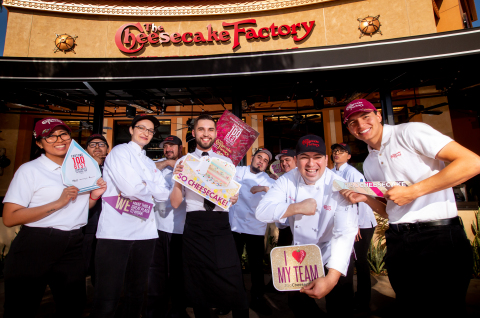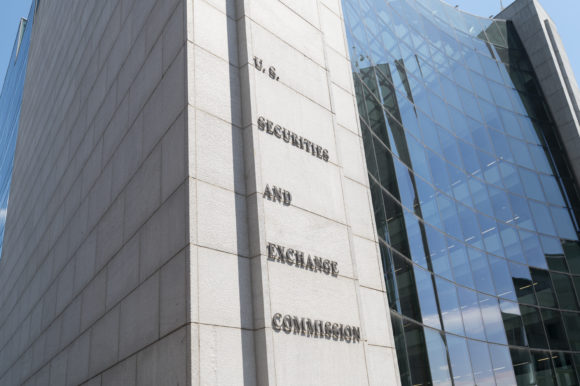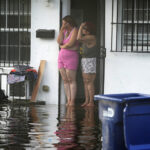The Securities and Exchange Commission said it has settled charges against The Cheesecake Factory Inc. for misleading disclosures about the impact of the COVID-19 pandemic on its business operations and financial condition. The SEC said the action is its first charging a public company for misleading investors about the financial effects of the pandemic.
The SEC’s order finds that The Cheesecake Factory violated reporting provisions of the federal securities laws. Without admitting the findings in the order, The Cheesecake Factory has agreed to pay a $125,000 penalty.
According to the SEC’s order, in SEC filings in March and April, The Cheesecake Factory stated that its restaurants were “operating sustainably” during the COVID-19 pandemic. However, the SEC says the filings were materially false because internal documents at the time showed that the company was losing approximately $6 million in cash per week and that it projected that it had only 16 weeks of cash remaining.
While the company did not disclose this internal information in its March and April SEC filings, the company did share this information with potential private equity investors or lenders in connection with an effort to seek additional liquidity.
(In April, the company closed on a $200 million investment from affiliates of Roark Capital, a transaction David Overton, chairman and chief executive officer said “not only meaningfully enhances our liquidity position to navigate the near-term COVID-19 landscape and get our affected staff members back to work as soon as practicable, but also importantly, solidifies our ability to manage the business for the long-term for all of our stakeholders once we emerge on the other side of this crisis.”)
In a Dec. 4 filing, the company acknowledged the settlement, said it “fully cooperated with the SEC in connection with the settlement” and agreed to it and the fine “without admitting or denying the SEC’s allegations.”
The SEC order also finds that, although the March filing described actions the company had undertaken to preserve financial flexibility during the pandemic, it failed to disclose that The Cheesecake Factory had already informed its landlords that it would not pay rent in April due to the impacts that COVID-19 inflicted on its business.
“When public companies describe for investors the impact of COVID-19 on their business, they must speak accurately,” said Stephanie Avakian, director of the SEC’s Division of Enforcement.

SEC Chairman Jay Clayton advised in March that companies should “provide investors with insight regarding their assessment of, and plans for addressing, material risks to their businesses and operations resulting from the coronavirus to the fullest extent practicable.”
Insurance industry analysts have been warning about the possibility of claims against companies and directors and officers stemming from the financial impact of the pandemic.
David Blades, associate director, industry research and analytics, for A.M. Best, said this summer that directors and officers insurers could be facing possible claims over failures to protect against substantial financial losses, as well from misleading disclosures relative to the pandemic, government investigations into pandemic relief, and financial troubles of travel, leisure, hospitality, retail and other sectors hit hard by the pandemic and lockdowns.
In one class action already filed, a Florida city’s retirement plan is suing Royal Caribbean cruise lines and various directors and officers.for allegedly misleading it and other shareholders over the financial impact of the coronavirus on its business. The plaintiffs allege that the company was not upfront about how the virus was affecting its bookings or how its safety protocols were working.
Norwegian Cruise Line Holdings, its chief executive and chief financial officer are also facing a securities lawsuit claiming the company made misleading statements about the virus to encourage customers to book cruises.
An investor lawsuit against Co-Diagnostic, a Utah DNA-testing company, alleges its principals falsely claimed its coronavirus diagnostic test was “100% accurate” and before doubts about the claim became widely reported, directors and officers of the company were selling off their own stock at its inflated price. The securities fraud lawsuit claims investors have lost millions of dollars.
A shareholder of Inovio Pharmaceuticals filed a class action complaint on March 16 against the company and its chief executive, citing “misstatements” that the company had developed a coronavirus vaccine in three hours.
Top Photo: Securities and Exchange Commission building in Washington, DC. (Photo By Bill Clark/CQ Roll Call via AP Images)
Topics Manufacturing COVID-19
Was this article valuable?
Here are more articles you may enjoy.



 Coverage Needed: Hundreds of Thousands in SE Now in Flood Zones With New Maps
Coverage Needed: Hundreds of Thousands in SE Now in Flood Zones With New Maps  Farmers Adjusters Cry Foul Over Workloads, Claims Handling in Letter to Regulators
Farmers Adjusters Cry Foul Over Workloads, Claims Handling in Letter to Regulators  Let Good Adjusters, Not Expensive Lawyers, Make the Difference on Claims, CEO Says
Let Good Adjusters, Not Expensive Lawyers, Make the Difference on Claims, CEO Says  As Rates Rise, Majority of Homeowners Say Insurance Industry Is in Crisis: Survey
As Rates Rise, Majority of Homeowners Say Insurance Industry Is in Crisis: Survey 

